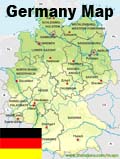Luther Decade launched for Reformation's 500th anniversary
 Wittenberg, Germany - In September 1508, a 24-year-old German monk named Martin Luther (1483-1546) moved from Erfurt to Wittenberg to continue his studies.
Wittenberg, Germany - In September 1508, a 24-year-old German monk named Martin Luther (1483-1546) moved from Erfurt to Wittenberg to continue his studies.
Nine years later, according to tradition, he nailed 95 theses to the door of Wittenberg's Castle Church (Schlosskirche), attacking the selling of indulgences by the Roman Catholic Church.
His action sparked the Protestant Reformation.
Wittenberg, a city of some 47,000 souls on the Elbe river between Berlin and Leipzig, launches the Luther Decade this weekend in the run-up to the Reformation's 500th anniversary.
The dramatic opening is set for Saturday with a reenactment of Luther's arrival on the banks of the Elbe.
The festivities then move into the city, where the locals and many guests will celebrate the famous theologian.
A special church service is planned for Sunday. Lectures, exhibitions, festivals, and concerts will be held at various places in the coming years up to 2017, the anniversary of Luther's posting of his theses.
"We're expecting a few thousand people from all over the world at the weekend," said Johannes Winkelmann, director of the cultural society WittenbergKultur.
The guests will include numerous prominent theologians.
Mark Hanson, president of the Lutheran World Federation and a resident of Chicago, will give the sermon at Sunday's special church service - in the Schlosskirche, naturally.
Before that, however, Wittenberg theologian Friedrich Schorlemmer and Christopf Stoelzl, previously Berlin's top cultural official, will engage in a disputation titled Jesus Was Revolutionary; The Church Became Conservative.
The venue is the Lutherhaus, the house where Luther lived and now a museum on the Reformation.
A cycling trio will help kick off the Luther Decade by retracing Luther's path.
On Friday, Ralf Grabsch, a Tour de France participant who was born near Wittenberg, and two other cyclists plan to set off for Wittenberg from St Augustine's Monastery in Erfurt.
Luther joined the Augustinian monastery in 1505 after having been nearly struck dead by lightning.
He took his monastic vows in 1506 and began studying theology in Erfurt in 1507.
Plenty of wine and music will also help mark the passing of half a millennium since Luther's arrival in Wittenberg.
A "monastery fete" is scheduled Saturday in the courtyard of the Lutherhaus. Visitors can have guided tours of the house and seminary.
The Lutherhaus is on UNESCO's World Heritage List, along with the local church, the Schlosskirche, and the house of Philipp Melanchthon, Luther's friend and fellow Protestant reformer.
Wittenberg's chief industry is Luther-oriented tourism - the city draws about 400,000 visitors each year - which it aims to boost during the Luther Decade.
Among the special events planned for next year is a conference on a commemoration of the Reformation in East and West Germany, a play called Luther/Chess, and regular orations in the local church on the theme of the seven days of Creation.
Internet: www. luther2017. de, www. wittenberg. de (dpa)